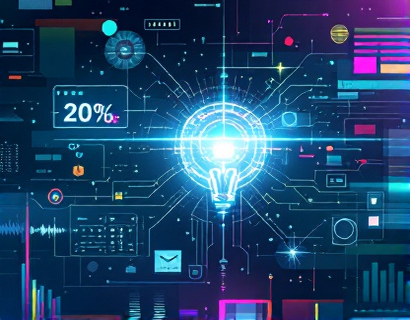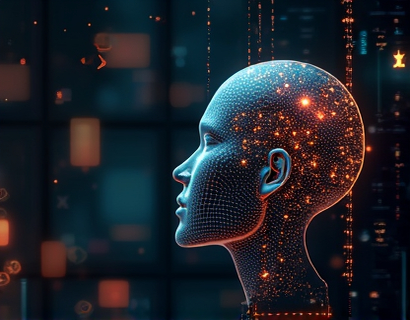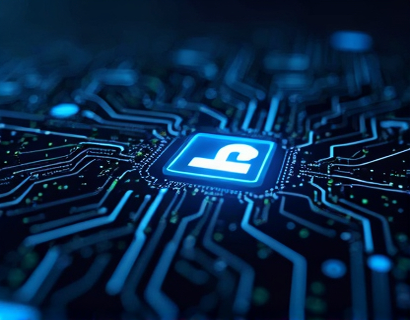Crypto-Powered Innovations: Leveraging AI for Next-Gen Digital Experiences
The intersection of cryptocurrency and artificial intelligence (AI) is giving rise to groundbreaking innovations that are reshaping the digital landscape. This convergence is not only enhancing user engagement but also driving unprecedented growth across various sectors. As we delve into this topic, we will explore how these cutting-edge technologies are being harnessed to create more intuitive, secure, and efficient digital experiences.
Understanding the Synergy Between Crypto and AI
To fully appreciate the impact of crypto-powered innovations, it's essential to understand the synergy between cryptocurrency and AI. Cryptocurrencies, particularly those built on blockchain technology, offer a decentralized and transparent framework that AI can leverage to enhance its capabilities. The immutable nature of blockchain ensures data integrity, while AI's ability to process and analyze vast amounts of data in real-time opens up new possibilities for both technologies.
The combination of these two fields creates a powerful ecosystem where data can be securely and efficiently managed, processed, and utilized to deliver personalized and seamless user experiences. This synergy is driving the development of new applications and services that were previously unimaginable.
Enhancing User Engagement Through AI-Driven Crypto Solutions
One of the most significant benefits of integrating AI with crypto technologies is the enhancement of user engagement. AI algorithms can analyze user behavior and preferences to provide tailored recommendations and experiences. In the context of cryptocurrency, this means creating more intuitive and user-friendly wallets, exchanges, and financial tools.
For instance, AI-powered chatbots can offer real-time customer support, answering queries and guiding users through complex processes with ease. These chatbots can understand natural language, making interactions more natural and efficient. Additionally, AI can predict market trends and provide insights that help users make informed decisions, thereby increasing their confidence and engagement with crypto assets.
Personalized User Interfaces
AI-driven personalization extends to user interfaces, making crypto applications more accessible and user-friendly. By analyzing user interactions and preferences, AI can adapt the interface to suit individual needs. This could include custom dashboards, simplified navigation, and context-aware features that enhance the overall user experience.
For example, a crypto wallet app powered by AI can learn a user's transaction patterns and automatically suggest optimal times for buying or selling assets based on market conditions. This level of personalization not only improves user satisfaction but also encourages longer engagement with the platform.
Security Enhancements Through Crypto and AI
Security is a paramount concern in the crypto space, and the integration of AI is revolutionizing how security is approached. AI algorithms can detect and respond to threats in real-time, providing a robust defense against cyber attacks. This is particularly crucial given the increasing sophistication of cyber threats targeting crypto assets.
One key application of AI in security is anomaly detection. By continuously monitoring transactions and user behavior, AI can identify unusual patterns that may indicate fraudulent activity. This proactive approach allows for immediate action to be taken, minimizing potential losses and enhancing user trust in crypto platforms.
Furthermore, AI can enhance the security of private keys and wallet addresses. Machine learning models can generate complex and unique keys, reducing the risk of unauthorized access. Additionally, AI-driven multi-factor authentication methods can add an extra layer of security, ensuring that only authorized users can access sensitive information.
Decentralized Identity Management
AI and blockchain together are transforming identity management in the digital world. Decentralized identity solutions leverage blockchain to create secure and verifiable digital identities, while AI can manage and authenticate these identities efficiently. This combination offers users greater control over their personal data and enhances privacy.
For instance, AI can facilitate the creation of self-sovereign identities, where users have full ownership and management of their digital identities. These identities can be verified and shared securely across different platforms, eliminating the need for centralized authorities and reducing the risk of data breaches.
Optimizing Operations with AI in Crypto Ecosystems
The operational efficiency of crypto platforms and services is another area where AI is making a significant impact. By automating routine tasks and optimizing processes, AI can reduce costs and improve performance. This is particularly beneficial for exchanges, wallets, and other crypto-related services that handle large volumes of transactions.
AI can automate trading strategies, execute orders at optimal times, and manage risk exposure. Smart contracts, powered by AI, can automate complex agreements and transactions, ensuring that all parties adhere to the terms without the need for intermediaries. This not only speeds up processes but also reduces the potential for human error.
Predictive Maintenance and Infrastructure Management
Crypto platforms rely on robust infrastructure, including servers and networks, to function smoothly. AI can play a crucial role in predictive maintenance, monitoring system health and predicting potential failures before they occur. This proactive approach ensures minimal downtime and maintains the reliability of crypto services.
Additionally, AI can optimize network resources by dynamically adjusting bandwidth and computing power based on real-time demand. This not only enhances performance but also reduces energy consumption, aligning with the growing emphasis on sustainability in the tech industry.
Innovative Financial Products and Services
The combination of crypto and AI is giving birth to innovative financial products and services that were previously unimaginable. These new offerings are not only enhancing user experiences but also opening up new revenue streams for crypto platforms.
One such innovation is AI-driven lending and borrowing platforms. These platforms use AI to assess creditworthiness and determine loan terms, making financial services more accessible and fair. By analyzing vast amounts of data, AI can identify patterns and risks that traditional credit scoring methods might miss, leading to more accurate and personalized lending decisions.
Another exciting development is the creation of AI-powered investment platforms. These platforms use machine learning algorithms to analyze market data, identify trends, and generate investment recommendations. Users can benefit from data-driven insights and automated trading, even if they lack extensive financial knowledge.
Tokenized Assets and AI-Enhanced Marketplaces
The tokenization of assets, combined with AI, is revolutionizing the way assets are bought, sold, and managed. Tokenized assets, represented by unique digital tokens on a blockchain, can be easily traded and divided, increasing liquidity and accessibility. AI can enhance these marketplaces by providing sophisticated search and matching algorithms, ensuring that buyers and sellers find the best deals quickly and efficiently.
For example, AI can analyze the characteristics of tokenized real estate assets and match them with investors based on their preferences and investment goals. This level of personalization not only improves the user experience but also increases the efficiency of the marketplace.
Challenges and Considerations
While the potential of crypto and AI innovations is vast, there are several challenges and considerations that need to be addressed. Regulatory compliance is a significant concern, as the crypto space is still navigating a complex and evolving regulatory landscape. Ensuring that AI-powered crypto solutions comply with local and international regulations is crucial for their success and adoption.
Another challenge is the need for transparency and ethical use of AI. As AI algorithms become more integrated into crypto platforms, it's essential to ensure that these systems are transparent and free from bias. Users must trust that their data is being used ethically and that AI decisions are explainable and fair.
Furthermore, the technical complexity of integrating AI with blockchain technology requires skilled professionals and significant investment. Organizations must prioritize research and development to stay at the forefront of these innovations and overcome technical hurdles.
Future Prospects and Opportunities
Looking ahead, the future of crypto and AI is bright, with numerous opportunities for growth and innovation. As technology continues to advance, we can expect even more sophisticated applications that further blur the lines between these two fields.
One area of excitement is the development of decentralized AI models, where AI training and inference are conducted on a blockchain network. This approach can enhance privacy, security, and decentralization, making AI more accessible and trustworthy. Additionally, the integration of AI with other emerging technologies, such as the Internet of Things (IoT) and 5G, will create new possibilities for smart and connected ecosystems.
In conclusion, the convergence of crypto and AI is driving transformative changes in the digital landscape. By enhancing user engagement, improving security, optimizing operations, and creating innovative financial products, these technologies are paving the way for a more connected, secure, and efficient future. As we continue to explore and harness the potential of this synergy, the possibilities for next-generation digital experiences are endless.











































